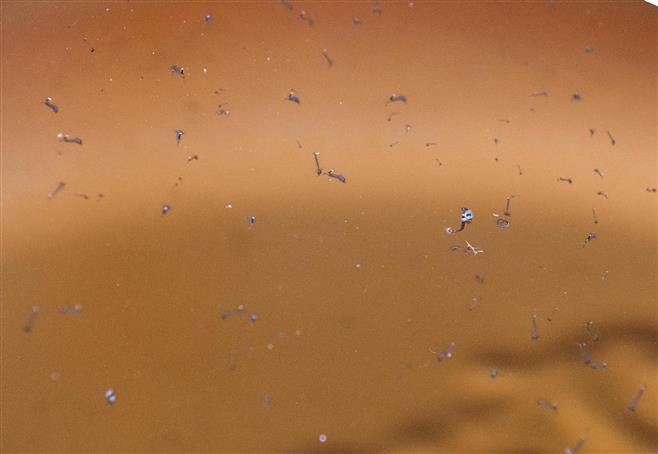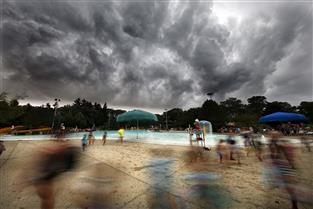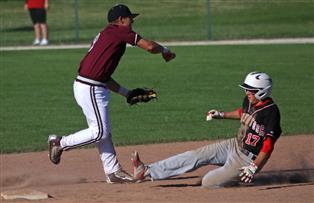What residents in Southeast Wisconsin need to know to prevent the spread of Zika virus

Mosquito larvae swim in a flower pot filled with rain water in the backyard of a home, Friday, Feb. 5, 2016, in Boca Raton, Fla. Florida's warm climate, year-round mosquitoes and revolving door of international travelers make it vulnerable to the Zika virus, but local governments aggressively urge people to dump or cover anything on their property that holds water so they don't end up raising mosquitoes that spread the virus through bites. Photo By Wilfredo Lee
Menomonee Falls —It may not be on the minds of most Wisconsinites amid the snow and frigid temperatures, but as the seasons change a major international health concern could have widespread effects right in our backyards.
Following the Feb. 1 declaration by the World Health Organization that has deemed the Zika virus an international public health emergency, local businesses and health care organizations are bracing for what the virus could mean at a local level.
Mild fever, skin rashes, muscle and joint pain and conjunctivitis are among the most common symptoms of the potentially fatal mosquito-borne illness, which has prompted several travel alerts to be issued to areas including the Caribbean as well as Central and South America.
Before the warmer temperatures make their ways back into the area, local pest control professionals are saying there are some things for those making plans for spring break to keep in mind.
While Wil-Kil Pest Control does not have the medical expertise to comment directly on the virus and symptoms, Regional Manager Randy Allen said the company is seeking to generate awareness about mosquito prevention.
"The biggest and most important thing when something like this comes up is that it is new and unknown, so we need to protect ourselves by being congnizant of exactly what it is we're talking about, what the symptoms are and how it could affect our families," Allen said.
The outbreak of the Zika virus, which is transmitted by mosquitoes, was detected in Brazil last May and has since moved into more than 20 countries in Latin America.
"Mosquitoes are vectors of so many diseases, so preventing exposure to them is nothing new," Allen said. "With that said, they have moved up as the most feared animal on the planet...it's kind of funny since they are so small, but their bite can be devastating."
That is among the reason why the U.S. Centers for Disease Control and Prevention has issued travel alerts for people planning to travel to countries and territories in the Americas with active Zika virus transmission.
"The good news is there are so many things you can do to protect yourself by learning about it and taking precautions whether you're traveling or simply readying for the summer months," Allen said.
The following are some tips and facts for people to consider:
What is the Zika virus?
The Zika virus is spread through the bite of an infected mosquito. This virus can cause illness in those who are bitten that can last for several days. For pregnant women, it can also cause birth defects. There is no vaccine or medicine to treat the Zika virus at this time.
Where is Zika virus found?
The growing pandemic is currently present in South and Central America. There have also been reports of Zika virus cases in Illinois, Florida, Texas, New York and more.
What tips are there for people traveling to affected areas?
· Minimize outside activity, particularly around foliage, between dusk and dawn, when the majority of mosquitoes are most active.
· It is best to use an insect repellent containing DEET, picaridin or oil of lemon-eucalyptus when outdoors.
· Wear long pants and sleeves.
What can you do in addition to to protect your home?
· Minimize opportunities for standing water in your yards. Bird baths are an example of a breeding ground for mosquitoes, as well as any other places like tire swings or puddles that accumulate after rain events.
· Consider having your lawn and foliage treated with mosquito repellent.
· Inspect your screens to reduce the opportunity for mosquitoes to enter the home.
· Learn whatever you can about diseases that could affect your family and what you can do to prevent them.

E-mail Newsletter
Your link to the biggest stories in the suburbs delivered Thursday mornings.
Enter your e-mail address above and click "Sign Up Now!" to begin receiving your e-mail newsletter
Get the Newsletter!
More from News and Features
- Menomonee Falls Girl Scout aids in Central America's conservation efforts
- Two suspects apprehended in Menomonee Falls armed robbery
- Wauwatosa's Luther Manor residents share smiles through flower delivery
- Major phase in Menomonee Falls' White Stone Station completed
- Menomonee Falls Police Reports, July 28, 2016
- The Falls Guy, July 28, 2016: A trip down memory lane
- Falls woman dreams of starting her own dessert bus
- Menomonee Falls man pleads guilty to homicide after killing bicyclist
- Wanakia Wildlife gives a bird's-eye view to Menomonee Falls Nature Camp kids
- Taste of Germantown event to raise funds for pavilion















We welcome reader discussion but strive to keep things civil. Please see our discussion guidelines and terms of use for more information. If you see a comment that violates our guidelines, please flag it for review. If you have any other issues with our commenting system, please let us know.